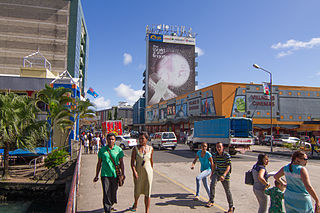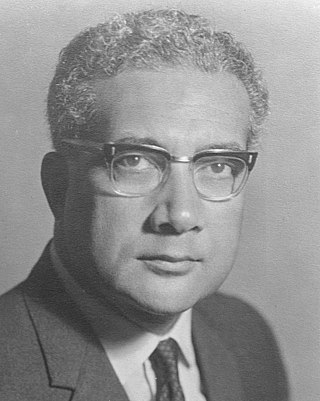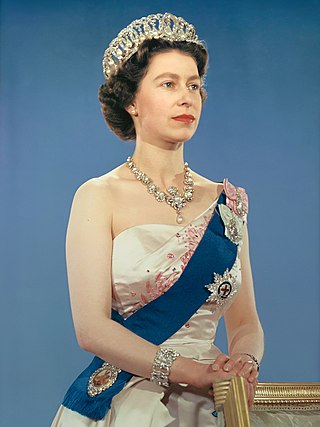Related Research Articles

Fiji, officially the Republic of Fiji, is an island country in Melanesia, part of Oceania in the South Pacific Ocean. It lies about 1,100 nautical miles north-northeast of New Zealand. Fiji consists of an archipelago of more than 330 islands—of which about 110 are permanently inhabited—and more than 500 islets, amounting to a total land area of about 18,300 square kilometres (7,100 sq mi). The most outlying island group is Ono-i-Lau. About 87% of the total population of 924,610 live on the two major islands, Viti Levu and Vanua Levu. About three-quarters of Fijians live on Viti Levu's coasts, either in the capital city of Suva, or in smaller urban centres such as Nadi or Lautoka. The interior of Viti Levu is sparsely inhabited because of its terrain.

Suva is the capital and largest city of Fiji. It is the home of the country's largest metropolitan area and serves as its major port. The city is located on the southeast coast of the island of Viti Levu, in Rewa Province, Central Division.

The politics of Fiji take place within the framework of a parliamentary representative democratic republic. Fiji has a multiparty system with the Prime Minister of Fiji as head of government. The executive power is exercised by the government. Legislative power is vested in both the government and the Parliament of Fiji. The judiciary is mostly independent of the executive and the legislature.

Laisenia Qarase was a Fijian politician. He served as the sixth Prime Minister of Fiji from 2000 to 2006. After the military quashed the coup that led to the removal of Mahendra Chaudhry, Qarase joined the Interim Military Government as a financial adviser on 9 June 2000, until his appointment as Prime Minister on 4 July. He won two parliamentary elections, but a military coup removed him from power on 5 December 2006. He was later imprisoned on corruption charges brought by the military-backed regime.

RatuSir Kamisese Mara, was a Fijian politician, who served as Chief Minister from 1967 to 1970, when Fiji gained its independence from the United Kingdom, and, apart from one brief interruption in 1987, the first Prime Minister from 1970 to 1992. He subsequently served as president from 1993 to 2000.

Josaia Voreqe "Frank" Bainimarama is a Fijian politician and former naval officer who served as the prime minister of Fiji from 2007 until 2022. A member of the FijiFirst party, which he founded in 2014, he began his career as an officer in the Fijian navy and commander of the Fijian military. Despite being suspended from Parliament, he served as the opposition leader from 24 December 2022 until 8 March 2023, when he resigned and was replaced by Inia Seruiratu.

RatuSeru Epenisa Cakobau was a Fijian chief, monarch, and warlord (Vunivalu) who united part of Fiji's warring tribes under his leadership, establishing a united Fijian kingdom. He was born on Natauloa, Nairai Island in Lomaiviti but spent his youth on Vanuaso, Gau, Lomaiviti, later returning to Bau to re-establish his Father's Ratu Tanoa Visawaqa reign. Ratu Epenisa Seru Visawaqa was given the name "Cakobau" meaning destroyer of Bau, in reference to his grandfathers' (Nailatikau) effort to first claim the tile from the people of Butoni and Lovoni, returned with most of his warriors from Vanuaso, Gau, Lomaiviti to coup the leadership in Bau then and later takeover his father's title; known after his father as the 6th "Vunivalu" or Warlord of Bau.

RatuNaiqama Tawake Lalabalavu MBE is a Fijian Paramount Chief and the current speaker of the parliament. He had served as the leader of the opposition.
Ratu Alifereti Finau Mara was a Fijian lawyer, politician, and diplomat. He was best known as the eldest son of former Prime Minister and President Ratu Sir Kamisese Mara. Since December 2001, he held the official position of Roving Ambassador and High Commissioner, representing Fiji's interests in Pacific Island nations. It was reported on 13 March 2006 that he had been chosen to succeed his late father as Paramount Chief of the Lau Islands, but in 2009 the succession was still unclear, with Mara reportedly refusing to discuss the issue with the village elders.

The first three-quarters of the 19th century were marked by tribal warfare, incursions from neighbouring Tonga, and the increasing encroachment of foreign powers. This period also saw the rise of a warlord by the name of Seru Epenisa Cakobau, who forged the first nation-state covering all of modern Fiji in 1871, before ceding it to the United Kingdom in 1874.

ʻEnele Maʻafuʻotuʻitonga, commonly known as Maʻafu, was a Pacific islander who held important titles in two countries in the Pacific. He was a traditional Tongan Prince and a Fijian chief nominated and installed by the Tovata chiefs of Lakeba and Vanua Balavu as 'Tui Lau' in 1869. This title was ratified by a wider council of Fijian chiefs and subsequently formalised under British colonial administration. In 1847, Maʻafu went to Fiji in an expedition to Vanua Balavu to investigate the killing of a preacher.

RatuKolinio Rokotunaceva was a Fijian chief and politician, who served as a Senator from 2001 to 2006 as one of 14 nominees of the Great Council of Chiefs. He held the traditional title of Tui Levuka.

The monarchy of Fiji arose in the 19th century, when native ruler Seru Epenisa Cakobau consolidated control of the Fijian Islands in 1871 and declared himself king, or paramount chief, of Fiji. Three years later, he voluntarily ceded sovereignty of the islands to Britain, making Fiji a crown colony within the British Empire.
RatuAisea Cavunailoa Katonivere was a Fijian chief and politician who hailed from the chiefly village of Naduri from the northern Province of Macuata, where he was the Paramount Chief and Chairman of the Provincial Council. He held the title of Caumatalevu na Turaga na Tui Macuata, which is usually abbreviated to Tui Macuata.

General elections were held in Fiji on 17 September 2014 to select the 50 members of Parliament. The FijiFirst party, led by Prime Minister Frank Bainimarama, won a landslide victory, winning 32 of the 50 seats. The Social Democratic Liberal Party and the National Federation Party were the only other two parties to cross the 5% electoral threshold and win seats.
Ballu Khan is an Indo-Fijian businessman of New Zealand citizenry. His company, Tui Management Services, is the joint owner with the Vanua Development Corporation (VDC) of Pacific Connex (PCX), which sells SAP software and has sought to enter the 3G mobile telephony market in Fiji. VDC is the commercial wing of the Native Land Trust Board (NLTB) which administers indigenous land holdings throughout Fiji. He is also a major supporter of the Ovalau Rugby Union team.
Lieutenant Colonel Pita Driti is a former Fijian soldier who played a prominent role in the 2006 Fijian coup d'état. He served as the Land Force Commander of the Republic of Fiji Military Forces, the third most senior position in the Military.
In Fiji, Turaga na Roko Tui Bau is a vassal chief of the Vunivalu of Bau. From his seat at the residence of Naicobocobo, the Roko Tui Bau rules the Vusaratu chiefs and has relationships with the Roko Tui Dreketi, Ratu Mai Verata, Roko Tui Namata, Roko Tui Veikau, Tui Vuya and other members of Fiji's House of Chiefs.
Jone Baledrokadroka is a Fijian academic and former soldier who served briefly as Republic of Fiji Military Forces Land Force Commander in January 2006. He was dismissed from the post after only four days after RFMF Commander Frank Bainimarama accused him of planning a mutiny. He is the son of former senator and Taukei ni Waluvu Ratu Alipate Baledrokadroka and the brother of Senator Adi Lagamu Vuiyasawa. He is also the uncle for New Zealand netballer Erikana Pedersen.
References
- ↑ "Tui Suva to be laid to rest". Fiji Broadcasting Corporation . 26 June 2010. Archived from the original on 20 July 2011. Retrieved 15 February 2011.
- ↑ "It's my land, says chief". Fiji Sun. 1 July 2008. Retrieved 21 April 2023.
- ↑ "Chief wants land compensation". Fiji Sun. 9 July 2008. Retrieved 21 April 2023.
- ↑ "State wins landmark case". Fiji Village. 23 December 2010. Retrieved 21 April 2023.